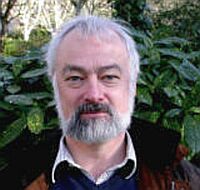01
Evo-Devo Again
Posted by jns on 1 June 2008 The beard at right belongs to author Wallace Arthur, Professor of Zoology at the National University of Ireland, Galway. I recently read his excellent book Creatures of Accident : The Rise of the Animal Kingdom (New York, Hill and Wang, 2006. x + 255 pages). Naturally, there’s a book note, with a couple of entertaining excerpts. The book, by the way, has its own website.
The beard at right belongs to author Wallace Arthur, Professor of Zoology at the National University of Ireland, Galway. I recently read his excellent book Creatures of Accident : The Rise of the Animal Kingdom (New York, Hill and Wang, 2006. x + 255 pages). Naturally, there’s a book note, with a couple of entertaining excerpts. The book, by the way, has its own website.
This is the second book* I’ve read about evo-devo: “evolutionary developmental biology”, sort of embryology informed by genetics and microbiology. Cool stuff, cutting edge, and learning some about it clarifies an unusual amount of evolutionary concepts for me. One key idea is that evolution doesn’t operate on adult animals, it operates on developing embryos. That small shift in perspective sheds a lot of light.
Author Arthur takes a delightfully cozy and intimate tone in his book, which I thought was almost like an expanded personal essay at times, and very enjoyable for it. Arthur managed to avoid a number of possibly intimidating details in pursuit of focusing on some central concepts over which he lingered a bit to avoid leaving any readers behind. I thought he did a great job and I enjoyed the book quite a bit. I also didn’t mind having a peek at the author’s photo inside the back cover occasionally, either.
Arthur set out to write without revealing his biases towards big questions about creation and whether a who or what was responsible for it, and he managed quite well until he got to his chapter called “Big Questions”, when he finally revealed himself. The preceding parts of the book had been so gentle that I was a bit surprised by his vehemence, although I wouldn’t argue with it in the least.
To research this chapter ["Big Questions"], I did something I had never done before: I visited some Web sites representing creationism in its many guises. This exercise was a revelation indeed, but probably not of the sort that the Webmasters had intended. What I found most striking was the appalling lack of integrity of those concerned. The deliberate misuse of quotations and details from the work of scientists suggested that all honor and honesty had been cast to the four winds. I realized that I was in a different social context from the one I have known and loved for my whole scientific career, where an honest search for the truth is at the heart of things. Instead, I was in a milieu where the dominant ethos was to force acceptance of a particular worldview by any means whatever. No holds barred. not the Spanish Inquisition perhaps, but the intention seemed the same; to stifle freedom of thought. And it mattered not whether I was in the grips of young-earth creationists or intelligent-design proponents. The latter were more slippery and difficult to pin down, but always in the end I found evidence of dishonesty. [p. 226]
__________
* The first, which I got very excited about, was Sean Carroll’s Endless Forms Most Beautiful.